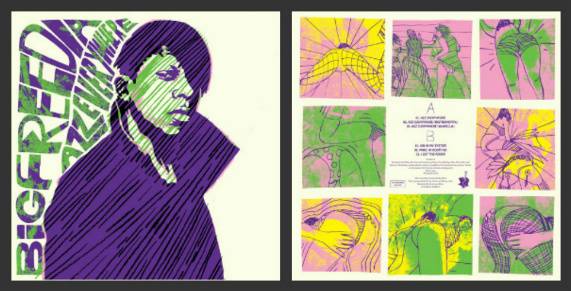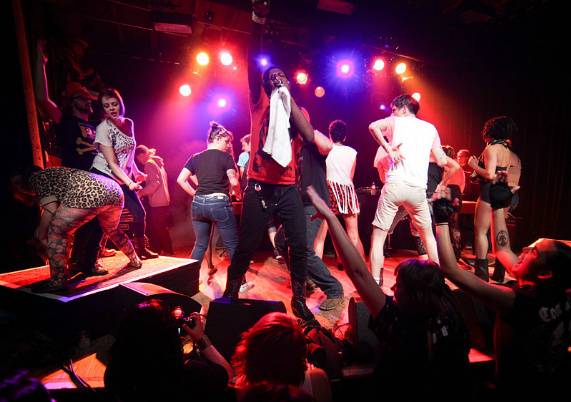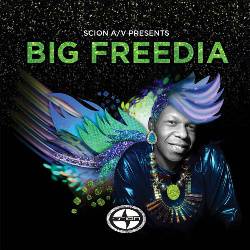
I was still living in Louisiana when the Bounce scene formed, but the music never really hit my radar. The dancing, however, did. Young girls at the mall, street festivals, and parades would bend over and, well, pop that ass. It was a thing. Something I wasn’t familiar with, certainly. And also something that I wasn’t interested in enough to pursue. Once I moved away from LA, I didn’t come across dancing like that again.
So when I began educating myself on bounce music (a sub-genre of hip-hop ), and Big Freedia in particular, I was surprised and delighted to see something familiar from my home state: “Hey! I know this!” It turns out that bounce music originated from New Orleans, and Freedia (along with Katey Red, the first bounce gay rapper in New Orleans to release a single) is one of its trailblazers. Big Freedia has been working in the bounce scene since the ’90s, and her effort is beginning to pay off. In the past few years, she’s been attracting quite a bit of press, as well as praise. Her 2010 album Big Freedia Hitz Vol. 1 was re-released on Scion A/V in March 2011, and a documentary based on her career is in the works:
Bounce
Though bounce’s influence has since spread to other states (Georgia, Tennessee, Mississippi), it is specific to the deep south, particularly News Orleans. In many ways it defines an entire culture. It communicates with a “core New Orleans audience that wants uplifting, party dance music instead of rap that focuses on lyrical development and narrative” (Fensterstock). As explained in Ya Heard Me, a documentary about the scene, “It’s not gangsta music; it’s not R&B. It’s project music. It’s truly a ghetto thing, and if you don’t understand it, it’s because that’s not where you’re from.”
Ya Heard Me
And Freedia’s particular shows, like the hip-hop shows by straight artists, include backup dancers — mostly female — bending over and popping their butts onstage. However, unlike straight shows, the women in the audience can sing along, using first person and male pronouns — not something they’re able to do at most hip-hop or rap shows: “[T]here’s something about being able to be the ‘I’ in the sentence… t’s tough to sing along about bitches and hos when you’re a girl. When you identify with Freedia, you’re the agent of all this aggressive sexuality instead of its object” (Dee).
Freedia’s music is bold, defiant, and jubilant, and her performances are fierce. Her shows are hot and sweaty and raunchy and sexy … almost like a bacchanal (without the cannibalism). There’s a celebratory joy in her shows like no other I’ve ever seen. She’s exultant, and triumphant, and irreverent. And so is the dancing.
“Azz Everywhere”
So, really, that’s all I’ve got. Big Freedia pretty much speaks for herself. During our interview, the conversation tended to stray a little from her music onto more serious topics. But that’s not necessarily a bad thing.
~~*~~
Smile Politely: Thank you for agreeing to this interview.
Big Freedia: Oh, no problem.
SP: You should know that some of the most enthusiastic responses we’ve gotten regarding Pygmalion’s lineup this year are for your show.
Freedia: Thank you so much.
SP: When exactly did bounce music hit the New Orleans scene? I’ve read contradictory histories of it. When did it start for you?
Freedia: Katey started in ‘98, and I started backgrounding her around that time. I was always listening to it and popping my little butt off, going to the high school dances and doing all of that. So yeah, I definitely was into it. It was the other rappers that came before me who are the legends, like Cheeky Blakk, DJ Jubilee, Partners-N-Crime, and so forth.

SP: One of my favorite hip-hop bands is God-Des & She, and in the documentary Hip Hop Homos they talk about experiencing discrimination in the hip-hop scene. I’ve also read that it’s the same for gay rappers in the bounce scene. Have you experienced that?
Freedia: I definitely can say I have, but I haven’t received a lot of flak lately. In the beginning it wasn’t all peaches and cream. When me and Katey first started, people weren’t as accepting of two gay rappers coming out. At some of the shows when we were really young, we’d have people throwing stuff at us. It was really interesting.
SP: But has that changed in the last five to six years? Is it getting better, especially considering the support among hip-hop artists that Frank Ocean got when he came out, and also Jay-Z and Russell Simmons coming out in favor of marriage equality?
Freedia: One of my goals and dreams was never to stop, because I thought, ‘if I’m getting this flak now, let’s see how it will be a few years later.’ I wanted to change that. I wanted to change the way people felt about a gay rapper coming from New Orleans. And I was determined to keep going, never stop, and never give up. And things have definitely changed over the years. People love me and are more accepting of me. They love Katey as well; they love all of the gay rappers actually. We were not giving up or stopping just because of the little fact that we got flak in the early days. I’m just proud that I didn’t give up and kept working really hard to change things and help guide things a little bit better than the way it was way back then.
SP: I think also at some point they just have to admit that you’re so damn good at what you do that it just doesn’t matter.
Freedia: That’s true. That’s why it was like, ‘damn there’s some gay guy and he’s tearing the club up.’ Yeah, definitely my hard work has a part to play in it as well.

SP: I’ve read that you were an evacuee during Katrina. I was already living in Illinois at the time, and it was devastating to watch. I can’t imagine what it was like for you.
Freedia: Yes. We were evacuated from Arkansas and taken to this military ground. And then we wound up in this church cabin in the woods, with big mosquitoes, and after I finally got in touch with my mom … it was probably about two or three weeks after the storm. And she went up to Shreveport to pick us up. I had one of my old checks for $800, and I signed it over to the church guy, and he gave me the money for a bus ticket. We met my mom in Shreveport and went to LaPlace for a while, and then that’s when I moved to Texas. I was in Texas for about six to eight months, until I was able to get back to New Orleans to the first available homes.
There was a lot going on in that transition after the storm. It’s something that definitely will live with me forever and ever.
SP: It sounds traumatic and it sounds frightening. But I’m glad you had help and your family was safe. And I’m glad you didn’t have to stay away from New Orleans for good.
Freedia: We just had Isaac that happened on the same day as Katrina. It was very scary — going through Katrina and then sitting through Isaac as well. I stayed because my mom didn’t want to leave, so we stayed and tried to ride it out. I’m still without power in my house. I’m still in a hotel. It’s crazy.
SP: Isaac was creepy as hell for me, the similarities. I can only imagine what actual residents were going through, having to experience that again.
Freedia: Some people lost their houses. The lower part, LaPlace — they got totally flooded out. The outer parishes got it the worst. It didn’t get New Orleans this time; it got the outskirts. Houses are under water. We checked it out and all we saw were the roofs. FEMA is down here, the Red Cross, a lot of rebuilding, all of that going on again.
SP: It’s infuriating that this keeps happening.
Freedia: It’s better in some ways. It’s becoming much better because they’re rebuilding everything. There’s a two-mile radius of buildings that have been torn down, and they’re rebuilding hospitals and cancer centers. It’s becoming really nice.
SP: That’s good to hear. I tend to focus on the negative most often. Speaking of all of this, can you talk about Treme. You performed on that show, correct?
Freedia: Yes, me, Katey, and Nobby.
SP: I know that it’s going to be tough to watch. I’ll have to psych myself up to watch a show about the months following the destruction of my beloved city. But I do plan to watch it eventually and your episodes are some of the reasons why.
Freedia: It definitely was interesting. It was very fun. I was very excited when they called and said they wanted me. They let me play myself, and they played a couple of my songs in an episode. We did like a club scene where I had everybody in the club rocking. It was very fun to do that, and I want to do that a whole lot more — that “acting in the movies” stuff. So Treme was very much another door opening for me. More exposure.
“Y’all Get Back Now”
~~*~~
Big Freedia will perform during Pygmalion at the High Dive this Saturday, the 29th, at 1:00 a.m. (so technically, that’s this Sunday). The UP Center of Champaign County is sponsoring the show, and DJs Randall Ellison, Mertz, and Belly are her opening acts.
Tickets available here.









 Freedia: Actually, I’ll be doing a mixture. A few from the greatest hits. I’ll be doing some stuff that’s never been heard. Some exclusive stuff. We’re gonna mix it up. I’ve been saving the new stuff from the album for when the tour starts and the album comes out. You might hear one from the album, but that’s about it. But you’ll hear a lot of new, fresh beats. That’ll be very exciting. I’ve been mixing it up a lot lately, kind of giving people a new show, hearing some of the new stuff that’s coming and how I’m changing the music a little bit. So you’ll definitely hear some new stuff that you can’t get anywhere on the Internet.
Freedia: Actually, I’ll be doing a mixture. A few from the greatest hits. I’ll be doing some stuff that’s never been heard. Some exclusive stuff. We’re gonna mix it up. I’ve been saving the new stuff from the album for when the tour starts and the album comes out. You might hear one from the album, but that’s about it. But you’ll hear a lot of new, fresh beats. That’ll be very exciting. I’ve been mixing it up a lot lately, kind of giving people a new show, hearing some of the new stuff that’s coming and how I’m changing the music a little bit. So you’ll definitely hear some new stuff that you can’t get anywhere on the Internet.